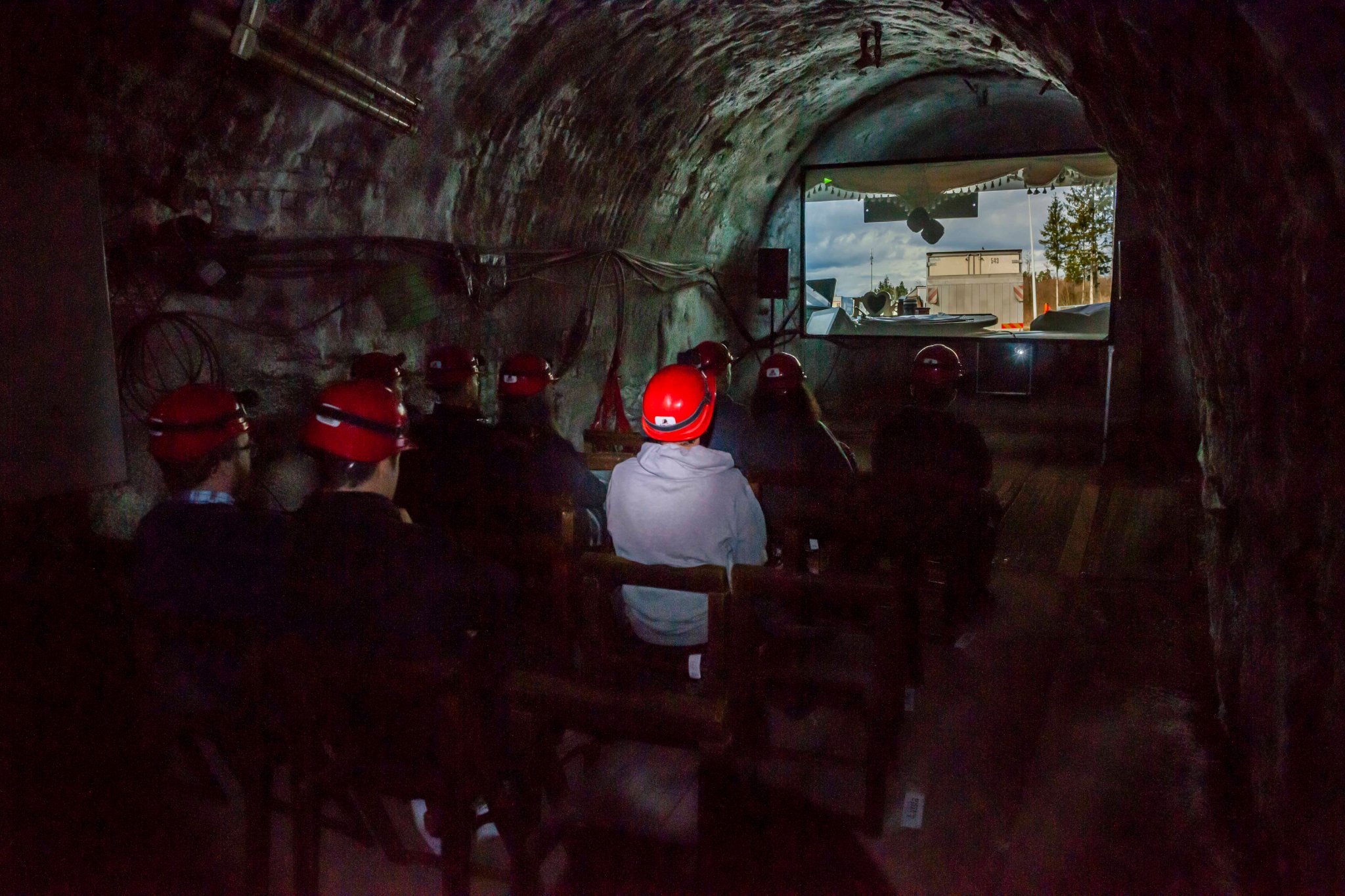Festivali
Kamerat, Hrastnik, 30/06 – 02/07 2022: Festival of working-class film

KAMERAT, which takes place in Hrastnik from June 30 to July 2, is the first and only working-class film festival in Slovenia and one of the few of its kind in the world. Inspired by the strike of workers of all industries in Hrastnik, who sought and fought for better working conditions in 1934, the festival organisers, as well as the local community, mark that very anniversary by celebrating solidarity, camaraderie and the importance of uniting for common goals in the local environment of historical landmarks of labour movements with traditional mining and glass culture, with film screenings in unique locations - in the mine, compressor station and the former mining work space. The uniqueness of these locations highlights the festival's originality, while reminding the audience, both with the on-screen film content and the space that surrounds us, of workers' rights, solidarity and camaraderie, values that are neglected or completely forgotten today.
The purpose of the festival, according to the organisers, is "to use film, as a means of social criticism, to explore the conditions of work at the crossroads of history and the future, and the question of the changing concept of work and workers' rights in different socio-economic-technological contexts". The festival is organised by the Public Institute for Culture, Sports, Youth and Tourism Hrastnik - KRC Hrastnik in cooperation with the Municipality of Hrastnik, the Movement for Decent Work and Social Society and numerous other partners.
Through connections with trade unions, activists, artists, cultural workers, and a great team of dedicated voluntary workers, the long-term goal is the festival affirmation at the national and international level in the context of film art, with various thematic round tables, discussions, photographic exhibitions, musical and other events, retrospectives and tributes, along with authentic local gastronomic specialties and drinks.
Now already the 2nd edition of this young, original and fast-developing festival presented a rich programme of 17 films, divided into programme sections: documentary, feature film, retrospective and Focus. In just three days, in addition to the 17 films shown, discussions with film directors, 3 round tables on labour rights topics, 4 exhibitions and 1 workshop were organised in unique locations: in the Mining Pit, the Compressor Station, the Machinehous, the mining work space, the Hrastink Youth Center (MCH), the garden of the Compressor station, etc.Screened films were: Metka, Meki (dir. Nika Autor, Slovenia, 2021), Good Day for Work (dir. Martin Turk, Slovenia, Bosnia and Herzegovina, 2018), Milk (dir. Grimur Harkonarsson, Iceland, Denmark, Germany, France, 2018), Don't come back the same way (dir. Jože Babič, Yugoslavia, Slovenia, 1965), Hero of the Working Class (dir. Miloš Pusić, Serbia, 2022), Factory for Workers (dir. Srdjan Kovačević , Croatia, 2021.), Hidden Objects (dir. Jiri Menzel, Czechoslovakia, 1969), Nova Šichta (dir. Jidrich Andrs, Czech Republic, 2020), Dukla (dir. David Ondfiček, Czech Republic, 2018), Return to Reims (fragments, dir. Jean-Gabriel Periot, France, 2021), Heat Singers (dir. Nadia Pafan, Ukraine, 2019), Exile, (dir. Visar Morina, Kosovo, Germany, Belgium, 2020), Savka (dir. Stephanie Brizé, France, 2019).
In the mine also, AGRFT student short films were shown: Čevljarna (dir. Anton Emeršić, 2017), 18.75 (dir. Aleksandar Kogoj, 2018), Uvajanje (dir. Anže Sobočan, 2018), Pepelni dobrci (dir. Aljoša Nikolić, 2020, the gesture by which the Kamerat festival shows its commitment to the affirmation of young authors.
This year’s country in Focus is the Czech Republic, and on that occasion an exhibition dedicated to the greatest Slovenian architect, Jože Plečnik, was organised. Plečnik left a historical mark in the architecture of both Slovenia and the Czech Republic, as the architect of the Prague Castle and the Church of the Heart of Jesus, but also as a professor at the School of Arts and Crafts, where more than fifty prominent Czech architects trained. The rich exhibition, consisting of 22 billboards with powerful photographs, descriptions and quotes from Plečnik's contemporaries and interpreters of his art, tells the story of this chapter of Plečnik's life and work.
Three round tables were held, with the topics: "Position of women in the labour market", "Where has the working class vanished?", and "Position of workers in the film industry: value and payment of creative work", which were attended by Nina Vodopivec, Ana Jakopič, Kristina Božić, Maja Bogojević, Goraud Kovačič, Goran Lučič, Branimir Štrukelj, Petra Bezjak Ciman, Hana Radlovič, Simon Tanšek, Matevž Luzar, Sara Gjergek and Hana Radlovič, with vibrant audience participation.
The exhibition "Silent monuments of the past - monuments of the rebellion in Zasavje" in the Zasav Museum Trbovlje represents the second part of the multi-year project of the Revolt in Zasavje, focusing on the history of the rebellion, which is an important part of the rich industrial heritage of this region. The focus is on eight monuments, represented by images, words and 3D visualization, which, apart from their message, are distinguished by their artistic value, because their authors are renowned Zasava artists, such as the academic sculptor Stojan Batič and the academic painter Franc Kopitar.
"Mining through children's eyes" presents the art works of elementary school pupils. On the occasion of 200 years of mining in Hrastnik, an art competition was held in the Public Institute for Culture, Sports, Youth and Tourism - KRC Hrastnik in cooperation with the elementary school under the mentorship of art teachers. The pupils created their visions of Hrastnik as a mining and workplace, the memories they have of that period, along with the stories told by their parents and grandparents. The pupils' creations are accompanied by an exhibition and digitisation of the works, so that they can be repeated in different spaces, and at the same time will serve as a significant monument.
The workshop "Traps of insecure work" was also held, as well as the projection of photos and an awards ceremony for the photography competition "Labour", with 31 authors and 56 works depicting industrial facilities, landscapes and human faces often looking tired of work.
Long live work, workers' films and the Kamerat festival!
M.B.

